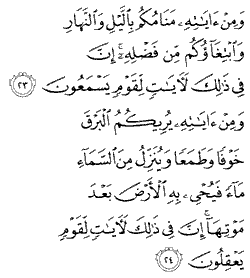Challenging Intellect, Intention, Past Pain
Issue 764 » November 15, 2013 - Muharram 12, 1435
Living The Quran
Challenging Intellect
Al-Rum (The Romans) - Chapter 30: Verses 23-24
 "And among His signs is your sleep at night and in the daytime, and your seeking of His bounty; surely in that are signs for people who listen. And among His signs is that He shows you the lightning that bears fear and hope, and that He sends down water from the sky, giving life thereby to the earth after it had been lifeless; surely in that are signs for people who use their minds."
"And among His signs is your sleep at night and in the daytime, and your seeking of His bounty; surely in that are signs for people who listen. And among His signs is that He shows you the lightning that bears fear and hope, and that He sends down water from the sky, giving life thereby to the earth after it had been lifeless; surely in that are signs for people who use their minds."
The succession of sleep and wakefulness followed by activity in earning one's living shows a biological and intellectual ability for the human being to live in harmony with the cosmic design of day and night in general, with the exception of those whose work is at night and thus they must sleep during the day, but such people are substantially fewer in their numbers.
The same natural features, such as the lightning that accompanies thunder, can have benefit and/or harmful effects on different people, and thus can raise hope, with its ensuing rain as well as fear of possible damage to homes or lives, in the human being, who is challenged to find protection from the harm through the human intellect. As a result of the challenge to the human intellect to find protection from lightning, the lightning rod was invented in the eighteenth century. Through such contrasting messages, the human being ought to think deeply about the creation and the Creator, about this life with all its pleasures and insecurities as well as the eternal pleasures of the life to come. Nature in its various phenomena represents an open and comprehensive exposition of knowledge throughout the world for all those who may perceive and contemplate.
Compiled From:
"Concepts of The Quran" - Fathi Osman, pp. 40, 41
Understanding The Prophet's Life
Intention
Causes are not made victorious through the efforts of fame seekers, but through the efforts of those who were described in a hadith to be "righteous, pious and quiet ... those who if they are present are not known and if absent, not missed, and those whose hearts are the lamps of guidance." [Al-Hakim]
Allah the Almighty does not accept a deed with shared objective, nor a heart with shared beliefs. We might say that we seek to establish an Islamic community, and Islamic State or an Islamic ruling system or that we work for restoring the integrated Islamic way of life, or any other short or long term objective, but our goal in all this should be to gain the Pleasure of Allah so that He may count us among His righteous servants.
Compiled From:
"Priorities of The Islamic Movement in The Coming Phase" - Yusuf Al-Qaradawi, p. 103
Blindspot!
Past Pain
The suffering we have experienced in our own life can also help us to appreciate the depths of other people's unhappiness. That is why it is important to revisit your own past pain. The dynamic of this Golden Rule is beautifully expressed in an early sura of the Quran (Ad-Duha) in which God asks Prophet Muhammad, peace be upon him, to remember the sorrows of his childhood - he had been orphaned as small child, parceled out to relatives, and for years was a marginalized member of his family and tribe - and make sure that nobody else in his community would endure this deprivation.
Our pain, therefore, can become an education in compassion. Some people deliberately steel their hearts against involvement with other people's suffering: the businessperson has no option but to sack an inefficient employee, and the doctor cannot afford to become emotionally distraught each time a patient dies. It is natural to try to avoid unnecessary grief. We don't want to listen to the sad story that a colleague is telling us. We feel that we have enough to deal with and push her troubles from our mind. We hurry past the homeless man outside the supermarket, refusing to allow his plight to disturb our equanimity. But when this happens, it is time to recall our own past distress. Remember the things that help you when you are having a bad day - a kind word, a smile, a joke - and try to give that gift to a testy colleague. Remember what it is like to feel alone with sadness and take the trouble to listen to your friend's tale of woe: "And one who asks for help - do not turn him away."
Compiled From:
"Twelve Steps to a Compassionate Life" - Karen Armstrong, pp. 99-102